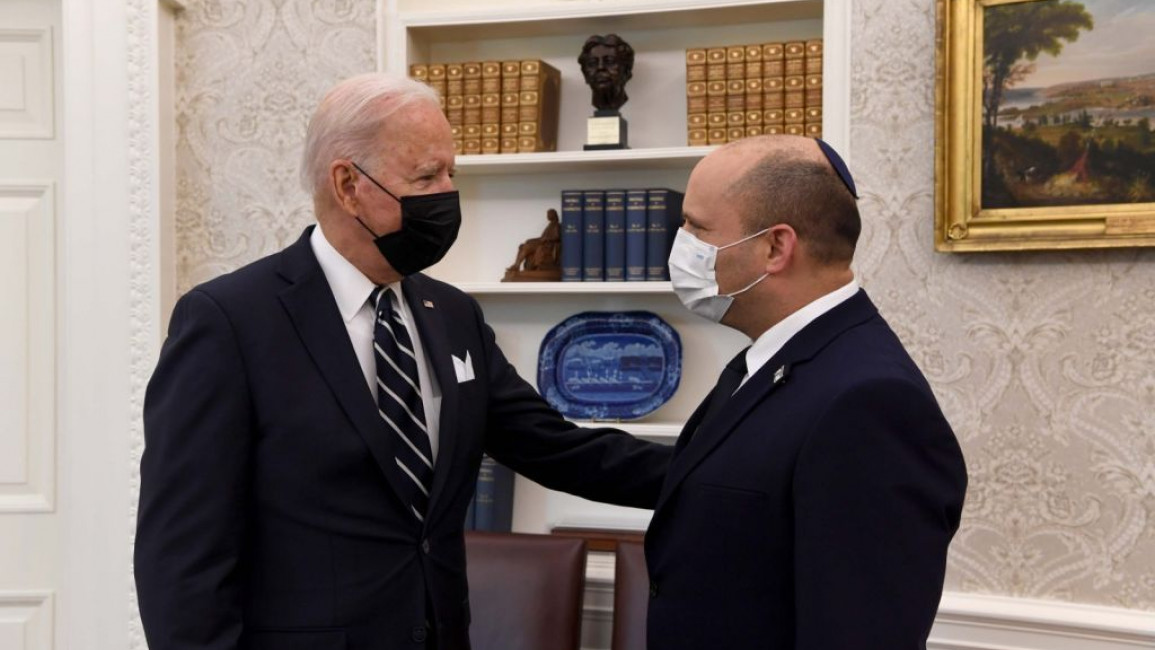Israel's Bennett, US' Biden meet after Kabul terror attack delay
Israeli Prime Minister Naftali Bennett met on Friday with US President Joe Biden the day after a deadly bomb attack near Kabul airport, the site of a US-led evacuation effort, killed dozens, including Afghans and American military personnel.
The event forced a postponement and has cast a shadow on an Israeli charm offensive.
"My heart goes out, our hearts go out, to all those who we've lost," Biden said after the two met one-on-one, a day after originally planned.
Bennett began his remarks with condolences before announcing, "I bring with me from Jerusalem a new spirit of good will."
His comment comes despite Jerusalem not being recognised as the Israeli capital by the vast majority of countries around the world, as well as the United Nation's position that East Jerusalem is Israeli-occupied Palestinian land. Palestinians view this as the capital of their future independent state.
Bennett had aimed to reboot US-Israel relations following Benjamin Netanyahu, who during 15 years in office embraced Republicans and antagonised Democrats.
He also hoped to gain US assurances against Iran obtaining a nuclear weapon.
Speaking to reporters after the meeting, the 49-year-old premiere said he had achieved his goals on his first official visit since taking office in June.
In particular, he said he was happy to hear Biden say he was determined Iran should "never" obtain a nuclear weapon. Previously, Biden had said Tehran would not obtain a nuclear weapon "on my watch."
"I found a leader who loves Israel, knows exactly what he wants and is listening to our needs," Bennett said.
Biden said he had shared common ground with Bennett, including traveling on the same train to Delaware.
"We've become close friends," Biden said. "He's ridden the Amtrak train a lot."
'Prosperity for Israelis and Palestinians'
Bennett took office in June as head of an eclectic coalition in which his pro-illegal settlement party holds only a handful of seats. His government ranges from the far right to centre-left, along with the first Palestinian-Israeli party to sit in a coalition.
"He heads and leads the most diverse government in Israeli history," the US president said of his Israeli counterpart, despite the latter's previous boasting about "killing Arabs".
Biden has aimed to make diversity a centrepiece of his administration, choosing Kamala Harris as the first woman of colour to serve as vice president.
However, Bennett's positions on key issues remain at odds with the White House.
He has said he will continue illegal settlement construction. Bennett is staunchly against Palestinian statehood, and prefers to offer economic improvements over discussing civil and national rights.
Bennett also opposes the US reopening a consulate in Jerusalem to handle Palestinian affairs, which Trump shut in 2019 after moving the US embassy to Israel from Tel Aviv to Jerusalem.
In the Oval Office, Bennett strove to highlight common ground.
"Israel knows that we have no better or more reliable ally in the world than the United States of America," he said.
Biden said the US had an "unwavering commitment" to Israel's security, including replenishing Israel's Iron Dome missile defence system. In a hint at differences of opinion, Biden said, "we're also going to discuss ways to advance peace and security and prosperity for Israelis and Palestinians."
Israel commits numerous violations against the Palestinian people and has been described as practising "apartheid" by many, including Human Rights Watch.
The #Israeli PM and #US President will meet for their first face-to-face meeting on Friday, after delays due to the deadly attacks in Kabul on Thursday. https://t.co/EPMCnJDO4k
— The New Arab (@The_NewArab) August 27, 2021
Shibley Telhami, a professor for peace and development at the University of Maryland, estimated that the attack in Kabul would not impact Biden's posture on Palestine.
"It further lowers the Israeli-Palestinian issue on Biden's priority, which means he is even less likely to challenge Bennett on this issue," he said.
'Putting diplomacy first' on Iran
Bennett said in the Oval Office that the bombings in Kabul highlighted the potential danger of a nuclear Iran.
"These very days illustrate what the world would look like if a radical Islamic regime acquired a nuclear weapon," Bennett told Biden.
Israel fiercely opposes Biden's attempt to reverse Trump's withdrawal from a 2015 nuclear deal that lifted sanctions on Iran in exchange for curbs on its nuclear program.
Since Trump's move, Iran has itself withdrawn from key commitments, including on uranium enrichment.
Biden pledged the US was committed to ensuring "Iran never develops a nuclear weapon, but we're putting diplomacy first and seeing where that takes us. But if diplomacy fails we're ready to turn to other options."
After he spoke, White House Press Secretary Jen Psaki clarified that diplomacy was "far and away our best option and the preferable option."


![President Pezeshkian has denounced Israel's attacks on Lebanon [Getty]](/sites/default/files/styles/image_684x385/public/2173482924.jpeg?h=a5f2f23a&itok=q3evVtko)



 Follow the Middle East's top stories in English at The New Arab on Google News
Follow the Middle East's top stories in English at The New Arab on Google News


